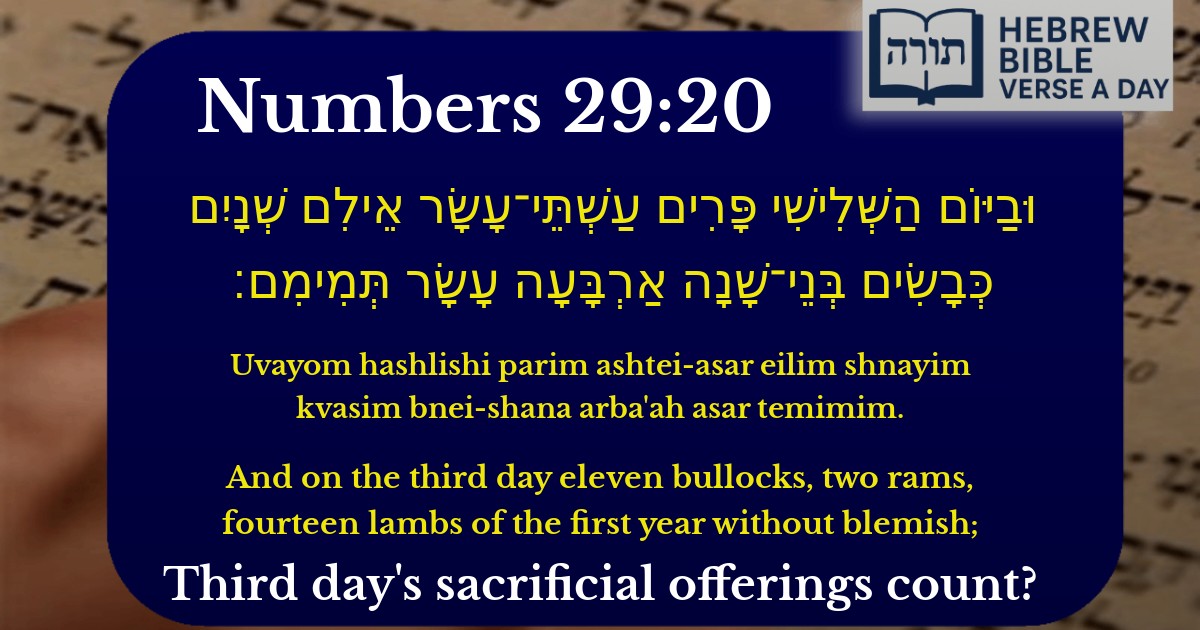Frequently Asked Questions
Q: What is the significance of the sacrifices mentioned in Numbers 29:20?
A: The sacrifices listed in Numbers 29:20 were part of the additional offerings (Musaf) brought during the festival of Sukkot. According to Rashi, the number of bulls decreased each day (from 13 to 7 over seven days) to symbolize the gradual reduction of offerings, teaching us humility and that our service to Hashem should not diminish in enthusiasm even as the quantity changes.
Q: Why are there specific numbers of animals for the sacrifices in this verse?
A: The Torah specifies exact numbers for each type of sacrifice to emphasize precision in serving Hashem. The Talmud (Sukkah 55b) explains that the total number of bulls offered over Sukkot (70) corresponds to the 70 nations of the world, showing that these sacrifices brought atonement and blessing for all humanity.
Q: What does 'without blemish' mean in Numbers 29:20?
A: The term 'without blemish' (תְּמִימִם) means the animals had to be physically perfect, without any defects. Rambam (Hilchos Issurei Mizbe'ach 1:1) explains this teaches us to offer only our best to Hashem, just as we should strive to serve Him with our complete and unblemished devotion.
Q: How does Numbers 29:20 relate to Sukkot today?
A: Although we no longer bring sacrifices after the Temple's destruction, we remember these offerings during Sukkot prayers. The Midrash (Bamidbar Rabbah 21:24) connects Sukkot's joy to these sacrifices, reminding us that our holiday celebrations should include spiritual offerings—such as prayer, Torah study, and acts of kindness—as substitutes for the physical offerings.
Q: Why does the verse mention 'the third day' specifically?
A: The 'third day' refers to the third day of Sukkot. Rashi notes that the Torah details each day's offerings separately to highlight the importance of consistency in divine service. Each day of Sukkot has its unique spiritual opportunity, and the decreasing number of bulls teaches that our commitment should remain strong even as external expressions change.


Context in the Torah
This verse appears in Bamidbar (Numbers) 29:20, detailing the sacrificial offerings brought during the festival of Sukkot. Specifically, it describes the offerings for the third day of Sukkot, which include eleven bulls, two rams, and fourteen unblemished lambs in their first year.
Rashi's Explanation
Rashi (Bamidbar 29:20) notes that the number of bulls decreases by one each day of Sukkot, starting from thirteen on the first day. On the third day, eleven are offered. He explains this gradual reduction symbolizes the diminishing of the nations' influence, as the seventy bulls sacrificed over Sukkot correspond to the seventy nations of the world (based on Sanhedrin 90b). The decrease hints at the eventual nullification of their power.
Symbolism of the Numbers
Rambam's Perspective
In Moreh Nevuchim (3:46), Rambam explains that the sacrifices serve to wean the people away from idolatrous practices by redirecting their worship toward Hashem. The specific numbers and types of animals may reflect historical or cultural contexts of the time, ensuring the transition to pure monotheism.
Spiritual Message
The Sforno (Bamidbar 29:20) emphasizes that the unblemished lambs ("temimim") signify the need for sincerity and wholeness in divine service. The third day, in particular, recalls the giving of the Torah on Har Sinai (traditionally on the third day of preparation), reinforcing the connection between Sukkot and kabbalat haTorah.